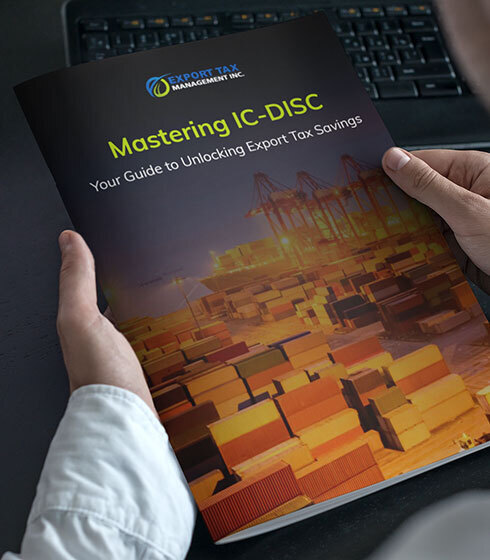New corporations often need IC-DISC explained. This federal income tax benefit for qualifying exports has many rules and requirements to navigate.
What is the IC-DISC? What are its benefits?
IC-DISC provides tax savings to United States businesses that export goods. The corporation is tax-exempt, allowing a company to transfer its income between the exporter and IC-DISC via an export sales commission. Deferring income is another benefit. An IC-DISC doesn’t need office space or employees; a shareholder or exporter must own the corporation.
This guide to IC-DISC tax will uncomplicate this incentive, providing a definition, explaining how to use IC-DISC, further exploring its benefits, and discussing a company’s eligibility.
Definition of IC-DISC
Let’s take this space to explore IC-DISC, including its purpose and a brief overview of how it works.
The Interest Charge Domestic International Sales Corporation is a Congress-issued tax incentive designed to expand the rate of export sales within the US. Eligible companies with qualifying exports can defer their income and enjoy greater tax savings.
The IC-DISC receives a commission on export sales and doesn’t pay taxes on the commission. An operating company receives a deduction for the commission payments at the standard tax rate.
Export Tax Management Inc. specializes in IC-DISC implementation. We can help you prepare a supplier agreement and file your corporate taxes. Learn more about what we can do for you by contacting us.
How to Use the IC-DISC

One of the areas of IC-DISC that corporations can benefit from is how to use this export tax incentive.
This section will explore establishment parameters to maximize your IC-DISC.
Formation and Setup of an IC-DISC Entity
A shareholder or exporter must own an IC-DISC, which must exist as a separate entity for C corporation exporters. The IC-DISC and C corp would share an entity relationship.
Exporters operating as flow-through entities create an IC-DISC as a subsidiary.
Electing to become an IC-DISC requires eligible entities to complete Form 4876-A, Election To Be Treated as an Interest Charge DISC. The form is available via the IRS.
The company’s chief accounting officer, treasurer, assistant treasurer, vice president, or president must sign, but tax officers or corporate officers can also. The deadline for filing Form 4876-A is nine months after the cessation of the tax year by no later than the 15th.
However, allowances are made if the 15th falls on a holiday or weekend, but the corporation must file by the next business day.
Tax Incentives and Advantages of IC-DISC
Many businesses elect to become IC-DISCS to take advantage of tax incentives and savings on their tax returns. Here is an overview of those benefits.
Taxation of Income
The IC-DISC explained tax incentives for exporters are a significant reason to apply for this tax status.
Qualifying businesses that export products internationally pay for a commission under IC-DISC rules. The commission costs go toward the corporation, which can deduct the cost under a business expense, lowering taxable income.
IC-DISCs are tax-exempt, so the entity does not have to pay federal income taxes on the commissions until they begin paying owner dividends.
When that happens, the shareholders are taxed at a rate of 23.8 percent on the dividends.
This total combines a net investment income tax rate of 3.8 percent plus a capital gains tax rate of 20 percent.
Tax Deferral Benefits for Exporters
Exporters that efer taxes under IC-DISC are in an advantageous position. Deferring the distribution of commissions as dividends allows the qualifying company to retain money.
The company’s additional capital can be funneled into many lucrative ventures, including creating and exporting new products, expanding warehousing, hiring more staff, or saving.
However, be aware that interest grows on the deferred taxes, so plan strategically when to resume payments..
Comparison of IC-DISC Benefits to Other Tax Planning Strategies

IC-DISC often gets compared to Foreign Derived Intangible Income (FDII). This tax incentive involves sales of intellectual property and related products for export. The deduction rate is 37.5 percent in the 2020s but will likely drop in 2025.
While IC-DISC and FDII benefit companies with foreign exports, they diverge in many ways, including:
- Only C corporations are eligible for FDII, whereas other business entities can apply for IC-DISC status.
- IC-DISC is more stable, with FDII rates positioned to drop.
- Indirect sales are applicable for IC-DISCs. FDII corporations cannot take a deduction if they sell to an intermediary before a foreign customer.
- IC-DISC corporations can raise an exporter’s net operating losses without taxable income limits. FDII requires taxable income.
- IC-DISC only applies to products and services, whereas FDII is for IP-related intangibles and properties.
- FDII does not require companies to manufacture goods in the US, while IC-DISC rules state that 50 percent of the company’s export value must be made in the US.
- FDII doesn’t demand structural changes within an organization, while IC-DISC requires forming a separate entity.
Still looking for more guidance on IC-DISC explained? Chat with the experts at Export Tax Management Inc.
Eligibility and Compliance for IC-DISC
Exporter Qualification Criteria
IC-DISCs must meet the following requirements to qualify:
- The IC-DISC is not part of a foreign sales corporation’s controlled groups.
- The IC-DISC maintains separate records and books from its corporate entity, such as a C corp or S corp.
- Most (95 percent) of its assets are export inventory.
- Most (95 percent) of its gross receipts are from products made in the US.
- The single stock class within the IC-DISC is valued at $2,500 (or higher).
Export Sales Qualifying for IC-DISC Benefits
According to the IRS Section 993 (a), Qualified Export Receipts, the following export sales are eligible for IC-DISC tax incentives:
- Gross receipts for managerial services related to the IC-DISC
- Gross receipts for architectural or engineering services provided for construction performed outside the US
- Interest on obligated qualified export assets
- Dividends for foreign export corporation stocks
- Gross receipts from qualified export assets, including the disposition, exchange, and sale
- Gross receipts for subsidiary-related services for a disposition, rental, lease, exchange, or qualified sale
- Gross receipts from renting or leasing export property outside the US
- Gross receipts for export property dispositions, exchanges, or sales
However, Section 993 underscores that sales “for the ultimate use in the United States” are ineligible for tax breaks under IC-DISC.
Compliance Requirements and Documentation

Accurate record-keeping and documentation will ensure compliance with IC-DISC explained requirements. Meeting reporting obligations, including presenting correct numbers and filing taxes by the due date, expedites a corporation’s receiving IC-DISC tax benefits.
Filing taxes as an IC-DISC requires the completion of Form 1120, Interest Charge Domestic International Sales Corporate Return. This IRS form requests information such as:
- IC-DISC election date
- Taxable income
- Deductions
- Costs of goods sold
- Gross income, including direct foreign sales, qualified export receipts, interest, and net gains
- Special deductions
- Inclusions
- Dividends, such as dividends from domestic corporations where the IC-DISC owns less than 20 percent
- Actual distributions
- Balance sheet data
- Other profits and earnings
- Previously taxed income analysis
- Accumulated IC-DISC income analysis
Potential Limitations and Risks of IC-DISC
We can’t present a guide on IC-DISC without delving into the risks and limitations of this tax break.
IC-DISC Limitations and Constraints
As generous as IC-DISC tax rules are, they do have their constraints. An IC-DISC’s income cannot exceed 50 percent of its combined taxable income on qualified export receipts and 10 percent of the export promotion expenses associated with the receipts.
Another limit is income cannot surpass four percent of an IC-DISC’s qualified export receipts and 10 percent of the export promotion expenses associated with those receipts.
Limitations might also apply according to transfer pricing rules.
Further, the distribution of commissions as dividends for an IC-DISC tax referral is only allowed at a rate of $10 million in export sales each year.
Risks Associated with IC-DISC Implementation
Corporations must be made aware of the potential risks of implementing an IC-DISC. Forming a separate corporate entity can be time-consuming and complicate annual taxes. Tax deferrals aren’t forever, and with interest accumulating in the interim, it behooves a corporation to shorten its deferral span.
The IC-DISC tax incentive has remained stable in recent decades, but future tax changes can reduce the rates corporations receive, making it less prudent to expand to an IC-DISC entity.
Key Considerations Before Setting Up an IC-DISC

Before your corporation branches off into an IC-DISC, consider these points:
- Do you meet the criteria to become an IC-DISC, including qualifying exports?
- Will the tax rate as offered positively benefit your company?
- Do you have the appropriate parties capable of forming an IC-DISC?
- Do you plan to continue selling foreign products?
- Is another tax incentive such as FDII better-suited for your corporation?
Get IC-DISC explained by Export Tax Management Inc. – set up your consultation.
Book a Consultation Today to Get IC-DISC Explained
Understanding IC-DISC is a must for businesses, but this tax incentive is not always as cut and dried as it seems on the surface. You need reliable service from Export Tax Management Inc. for IC-DISC explained, including implementation and more.
Make the most of your foreign exports with Export Tax Management Inc.

